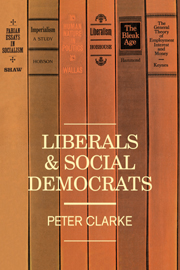Book contents
- Frontmatter
- Contents
- Preface
- System of references
- Prologue: Original sin and the modern state
- 1 The passion for improving mankind
- 2 Good men fallen among Fabians
- 3 Imperialism
- 4 The State and the Nation
- 5 Human nature in politics
- 6 War
- 7 Hobson's choice
- 8 The bleak age
- Epilogue: Sans everything
- Bibliographical notes
- Appendix
- Index
5 - Human nature in politics
Published online by Cambridge University Press: 14 January 2010
- Frontmatter
- Contents
- Preface
- System of references
- Prologue: Original sin and the modern state
- 1 The passion for improving mankind
- 2 Good men fallen among Fabians
- 3 Imperialism
- 4 The State and the Nation
- 5 Human nature in politics
- 6 War
- 7 Hobson's choice
- 8 The bleak age
- Epilogue: Sans everything
- Bibliographical notes
- Appendix
- Index
Summary
FURTHER INTERVALS OF HUMAN NATURE
Hobhouse's son Oliver later wrote that ‘Father was immensely conservative in some ways, and would not take up with a reversal of the old order of things’ (Memoir, p. 90). One example was his hostility to motoring. This was a favourite grievance on the Nation, and opposition to the Road Board was its main reservation over Lloyd George's constructive approach to national finance. Motor cars manifested an intrusion upon the amenities of the countryside by an unfeeling privileged class; it was only after Hobhouse bought one himself that he was able to contain his outrage. On bloodsports he felt so strongly that it precluded the temptations of taking up hunting. The Hammonds were passionately committed on both these issues, and indeed concern for animals seemed to them an indispensable part of a humane outlook upon society. As Samuel put it to Wallas, ‘the same temperament which makes a man a really sincere social reformer often also makes him abstain from “sports” which involve suffering to animals’ (31 January 1917). There was an incident in 1911, in which Shaw was supposed to have boasted of running over thirteen dogs in his car, which seemed to make all the connexions explicit. ‘Mr Hobhouse came over yesterday afternoon in a white heat of indignation about it’, Barbara Hammond wrote to Gilbert Murray. ‘I suppose all motorists lose their moral sense but very few acknowledge it so openly & brutally as Mr Shaw’ (12 March 1911).
- Type
- Chapter
- Information
- Liberals and Social Democrats , pp. 128 - 163Publisher: Cambridge University PressPrint publication year: 1978



